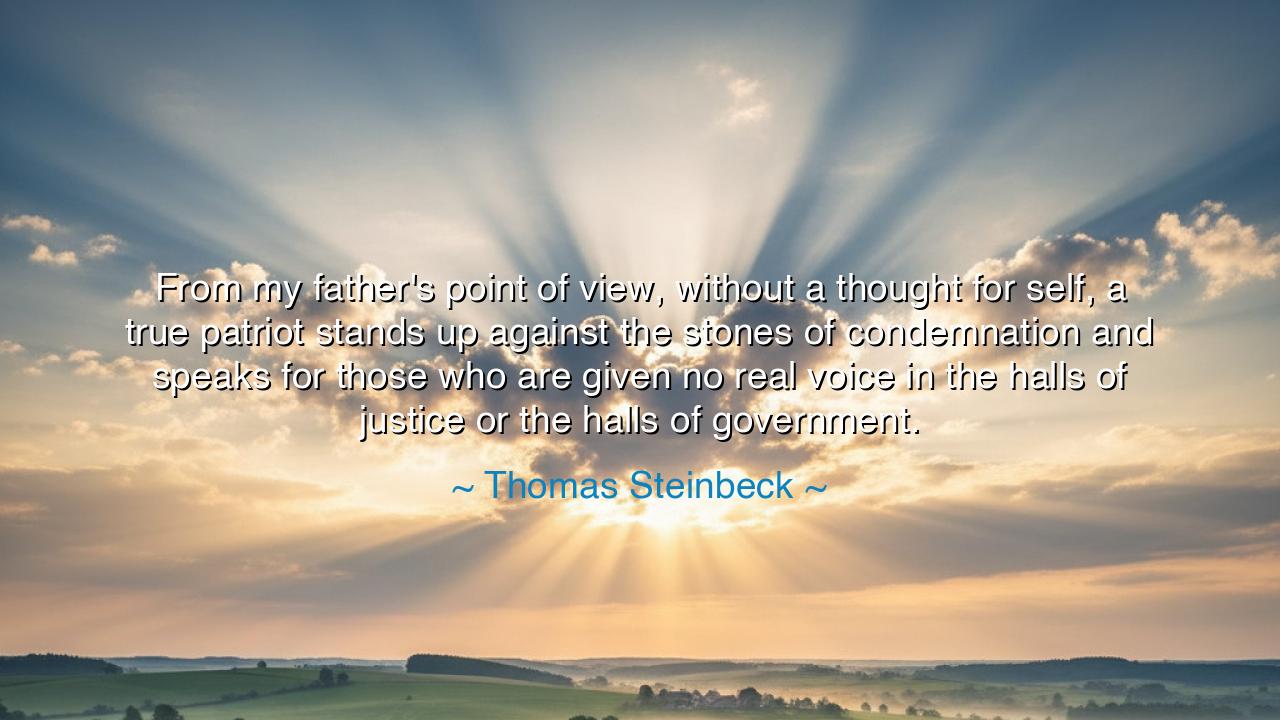
From my father's point of view, without a thought for self, a
From my father's point of view, without a thought for self, a true patriot stands up against the stones of condemnation and speaks for those who are given no real voice in the halls of justice or the halls of government.






Hearken, children of the future, and attend to the solemn wisdom of Thomas Steinbeck, who declared that “From my father's point of view, without a thought for self, a true patriot stands up against the stones of condemnation and speaks for those who are given no real voice in the halls of justice or the halls of government.” In this profound declaration lies the eternal truth that patriotism is not a mere sentiment of allegiance, nor a display of superficial loyalty. It is the courage to champion justice, to defend the vulnerable, and to act selflessly, even when the world casts judgment, scorn, or ridicule.
The origin of this reflection arises from the moral landscape observed and inherited from Steinbeck’s father, whose understanding of civic duty was inseparable from ethical courage. In the crucible of society, there are always those who are silenced, marginalized, or oppressed. True patriots, Steinbeck reminds us, do not serve the easy comforts of self-interest or the applause of peers. They defend the principles of justice and fairness, giving voice to the voiceless, and ensuring that the nation remains a vessel of integrity rather than convenience.
Consider the historical example of Abraham Lincoln during the American Civil War. Though facing condemnation from many quarters, he spoke for those enslaved and oppressed, those denied a voice in the nation’s halls of justice. He endured scorn, political opposition, and personal peril, yet he acted selflessly for the greater good. Here we see the embodiment of Steinbeck’s vision: a patriot’s loyalty is measured not by safety or comfort, but by the willingness to confront injustice and champion those who cannot defend themselves.
Steinbeck’s words also illuminate the moral cost of genuine patriotism. To stand against the stones of condemnation is to risk reputation, livelihood, and sometimes life itself. Yet it is precisely this courage—faced with adversity and opposition—that enshrines the virtue of the patriot. Loyalty to the nation is not the adherence to its prevailing opinions or comfort zones, but the defense of its deepest ideals: justice, equity, and the protection of all citizens, especially those denied representation or opportunity.
In modern reflection, this wisdom challenges citizens to act beyond self-interest. Whether in governance, activism, or everyday life, true patriotism calls for courage, discernment, and empathy. It is the refusal to remain silent when injustice prevails, the determination to speak truth to power, and the commitment to amplify voices that are ignored or silenced. Steinbeck teaches that the strength of a nation is not found solely in its armies, laws, or borders, but in the moral courage of its people.
From this reflection flows a practical lesson: cultivate selflessness and moral courage. Stand for justice, advocate for the marginalized, and speak truth even when it is inconvenient or unpopular. Engage with the structures of governance, law, and society, ensuring that those without influence are heard. True patriotism is lived through action, through the defense of principle above personal safety or gain, and through unwavering commitment to the collective good.
Moreover, inspire others to embrace this form of patriotism. Teach the young and your peers that love of country is inseparable from ethical courage, that a nation is measured by how it protects its weakest, and that those who stand for justice shape the enduring character of society. By nurturing a culture of moral responsibility and vigilance, communities become resilient against corruption, neglect, and oppression.
Thus, children of tomorrow, inscribe upon your hearts this eternal truth: a true patriot acts without thought for self, stands resolute against condemnation, and speaks for those denied a voice. Let your loyalty to your country be measured in deeds, courage, and integrity. In defending justice, amplifying the marginalized, and confronting wrongdoing, you honor the sacred covenant between citizen and nation, as Thomas Steinbeck so eloquently teaches, ensuring that patriotism remains a living, virtuous force across the ages.






AAdministratorAdministrator
Welcome, honored guests. Please leave a comment, we will respond soon